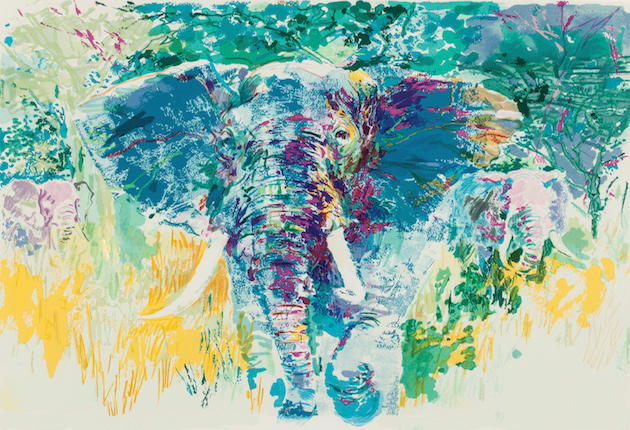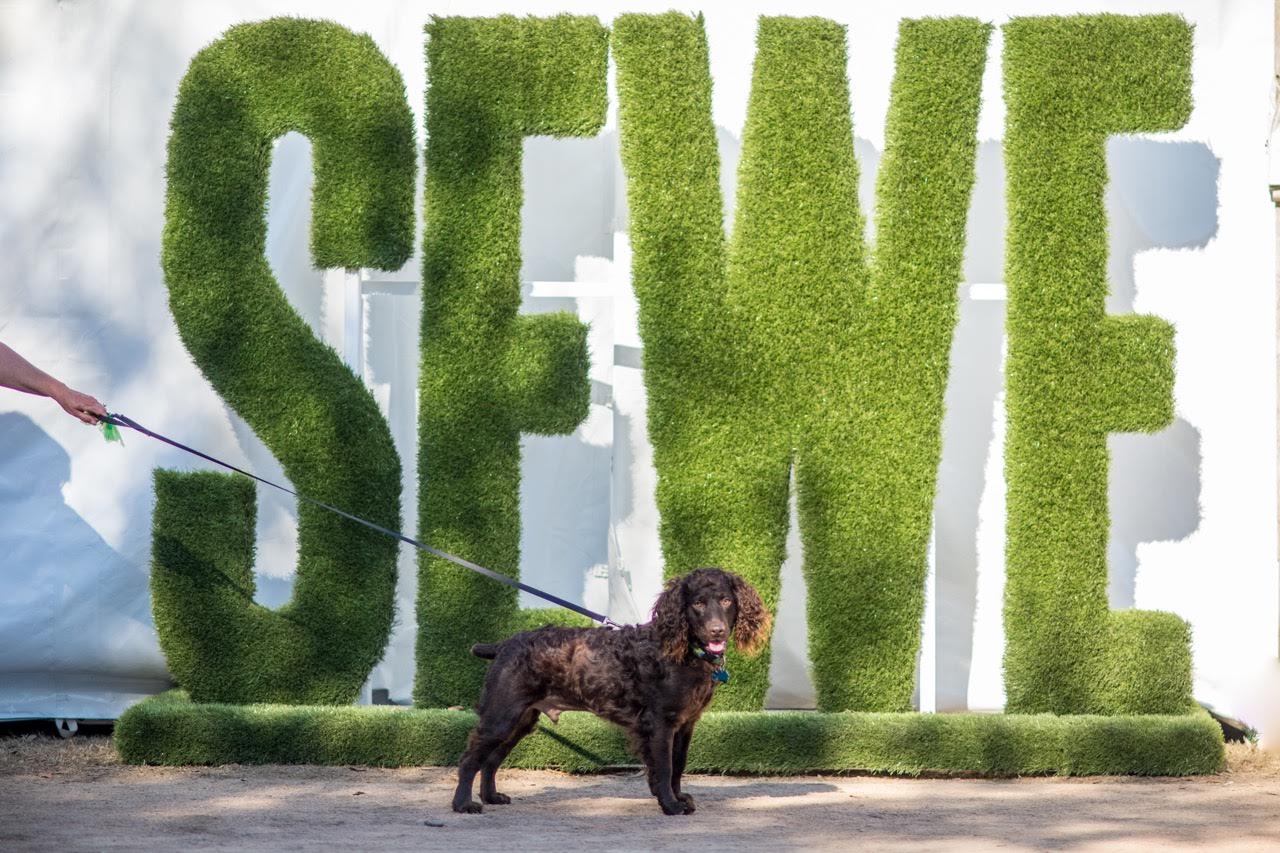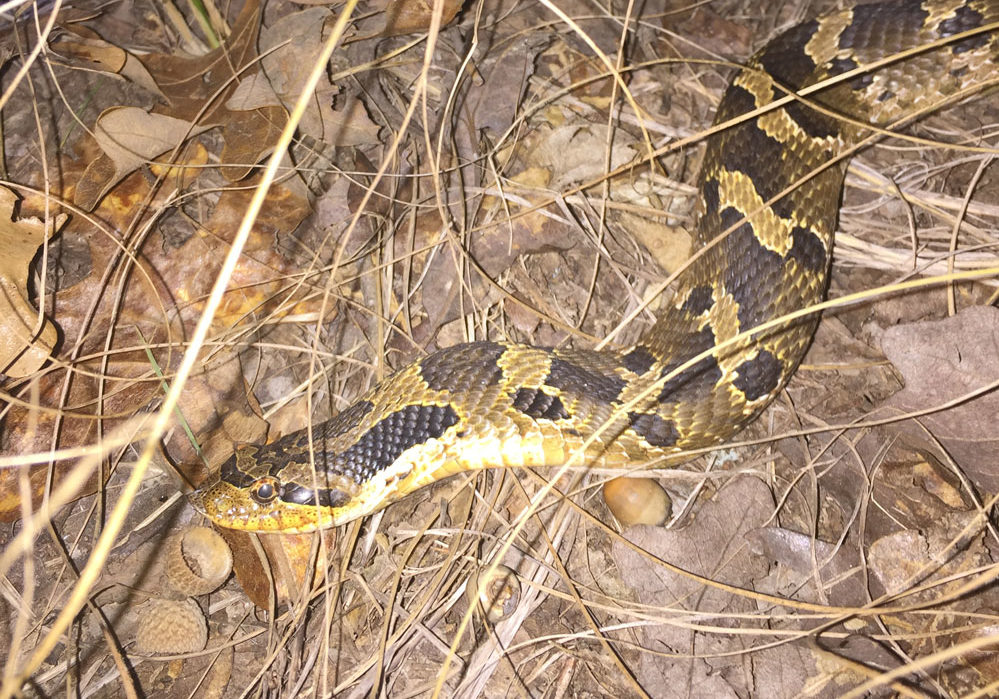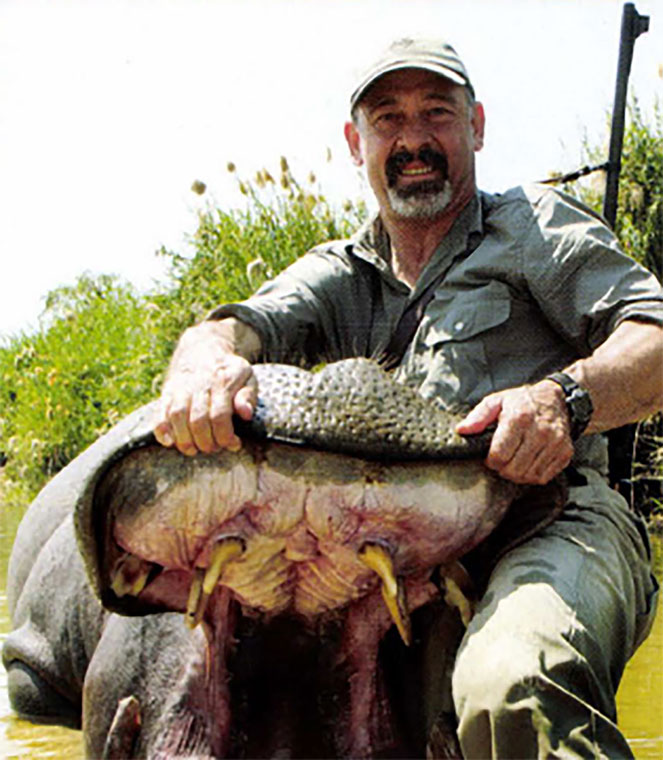The following is a collection of excerpts from his book Wild Beasts, Birds & Reptiles of the World: The Story of Their Capture.
Dangerous Game
My young friend Bob Marshall was picking his way through the South African jungle when he paused to look upon a striking scene. A beautiful leopard had run a short distance up the sloping trunk of a fallen tree, and then, turning about on a large projecting limb, he faced a pack of hyenas that was eager to attack him. One rash fellow ventured nigh enough to receive a cuff from the defender’s paw, which knocked him a dozen feet and caused him to keep a safe distance thereafter, while the others were careful to avoid those sharp claws and teeth.
Bob was inclined to raise his Winchester and fire upon the cowardly assailants, but he finally moved off without doing so.
The leopard won’t appreciate my interference, he thought, and I don’t believe he needs it anyway.
Bob was on his way back to camp, as the sultry day was drawing to a close, and he kept a close watch for danger.
His listening ear caught the sounds of the myriad birds flitting among the branches overhead, and now and then the deep, resonant roar of some animal warned him that he was liable at any moment to be brought face to face with some of the fierce denizens of the wild, always eager to fly at any intruder.
It was his growing conviction that something was stealthily following him, which tried Bob’s nerves, for it is the unseen that truly tests one’s bravery.
He was sure that the limbs in his immediate vicinity contained no hideous python or boa constrictor, for these reptiles must of necessity wind themselves around the trunk or branches overhead where the quick eye of the hunter readily detects them. He knew his hearing, trained to marvelous nicety, was sure to catch the soft rustle which invariably betrays the approach of a large snake.
It must be some beast crouching so flat on a branch that his body is entirely hidden—there he is, sure enough!
Barely 30 feet above the head of the youth was an immense limb put forth from a tree whose trunk was no more than a rod from where he stood. The diameter of the branch was sufficient to hide most of a large animal, except for its glowing eyes and open mouth that protruded just far enough for the young hunter to identify the beast as an enormous leopard.
So skillfully had the leopard disposed himself on the limb that more than likely Bob would not have detected him but for the low, threatening growl that he emitted.
Had the leopard held his peace and kept his head lowered, the youth would have walked directly beneath him, giving the treacherous animal a chance to bound down on his shoulders like a thunderbolt. But the leopard did not know enough to take that precaution.
“I think there is enough of your head in sight to make a pretty fair target,” muttered Bob, bringing the rifle to his shoulder and sighting at the skull.
The distance was so short that there was hardly any excuse for missing, but that is just what Bob Marshall did do, though we can hardly censure him because of the failure.
By one of those rare coincidences that occasionally take place, the leopard, from some cause that cannot be explained, ducked his head almost at the instant the weapon was discharged, the bullet cutting its way through the dense vegetation beyond and above the limb.
Keeping his weapon elevated, Bob instantly shoved another cartridge into place, and as the threatening head rose to sight, he let fly three times in quick succession.
Bob did not score a “bull’s eye” each time, but he did hit the leopard, the balls plowing their way through the outer portions of his head and inflicting wounds that roused him to fury.
Confident that he had killed the beast, Bob lowered his gun and looked to see him fall. The leopard came down, but not as the youth expected.
Instead of tumbling from his perch, limp and lifeless, he emitted a snarling screech, and sprang from the limb straight at the youth, who was almost paralyzed by the sight of the terrible head streaked with blood, the ears lying flat, and the jaws extended to their fullest extent. The sharp, carnivorous teeth and needle-like claws were eager to rend the lad to shreds.
Had Bob Marshall stood motionless in his footsteps, nothing could have saved him, but in obedience to what may be termed instinct rather than reason, he sprang back several feet just as the leopard dropped lightly to the ground, and crouching low, gathered his muscles for a quick leap that would land him on the shoulders of the youth.
Bob was not long in pumping a barrage of Winchester balls at the snarling leopard, but the recipient of this bombardment remained quiescent. Hardly had Bob pulled the trigger when the leopard bounded at him with a ferocity that can only exist when a wild beast is in his death-throes.
Bob had no time to recoil, but with admirable presence of mind and inimitable dexterity, he dropped to a crouching posture and took a single step forward. As a consequence, the leopard jumped clean over him. Bob wheeled again and brought the gun to his shoulder.
Three shots still remained in the Winchester, and no three cartridges were ever discharged with more celerity. Every one, too, lodged in the body of the beast, which settled the business.
Deprived of the power of assault, and mortally wounded in half a dozen places, the brute rolled upon his back and, after a rasping snarl, became still and motionless.
Bob Marshall stood aside and calmly surveyed his game, after all semblance of life had departed.
“That’s the biggest leopard I ever saw,” said he. “The usual length of the animal is four feet, with its tail a little more than half as much, but this fellow is fully five feet long, and he would have been a terrible foe if I had allowed him to close in on me.”
The youth noticed that the afternoon was wearing away, and as he was a considerable distance from camp, he decided to set out on his return, then come back on the morrow to retrieve his handsome trophy.
Robert Marshall slung his Winchester over his shoulder and set off for the encampment and his friends.
A Strange Experience
Lest you think I am romancing, I beg to assure you that the incident which I am describing is true in every particular.
The infuriated wild boar charged so swiftly upon the youth that he reached the pony before his steed could comprehend his peril and gather himself for flight.
In accordance with his instincts, the boar ran his head directly beneath the horse, with the intention of disemboweling him by an upward flirt of those terrible tusks; but in his rage, he drove his snout beyond the steed, so that when it was flung aloft, it missed the body of his victim, and the blade-like ivories clove empty air instead of flesh and bone.
But the swing of the head lifted the pony entirely off his feet, and he fell broadside across the neck of the boar, kicking and striving desperately to free himself from the brute beneath him.
Dick had dropped his gun and strove to leap from the back of his horse, but before he could do so, the horse had fallen, and the boy’s foot was inextricably caught in the stirrup.
It was a strange sight: the kicking pony on his side across the neck of the animal with the rider entangled, while the boar himself resumed his trot toward the edge of the jungle, which he had nearly reached when he wheeled about to charge his tormentors.
The distance, at the very least, was a hundred yards, and, incredible as the statement may seem, the boar carried the pony and Dick Brownell the entire way.
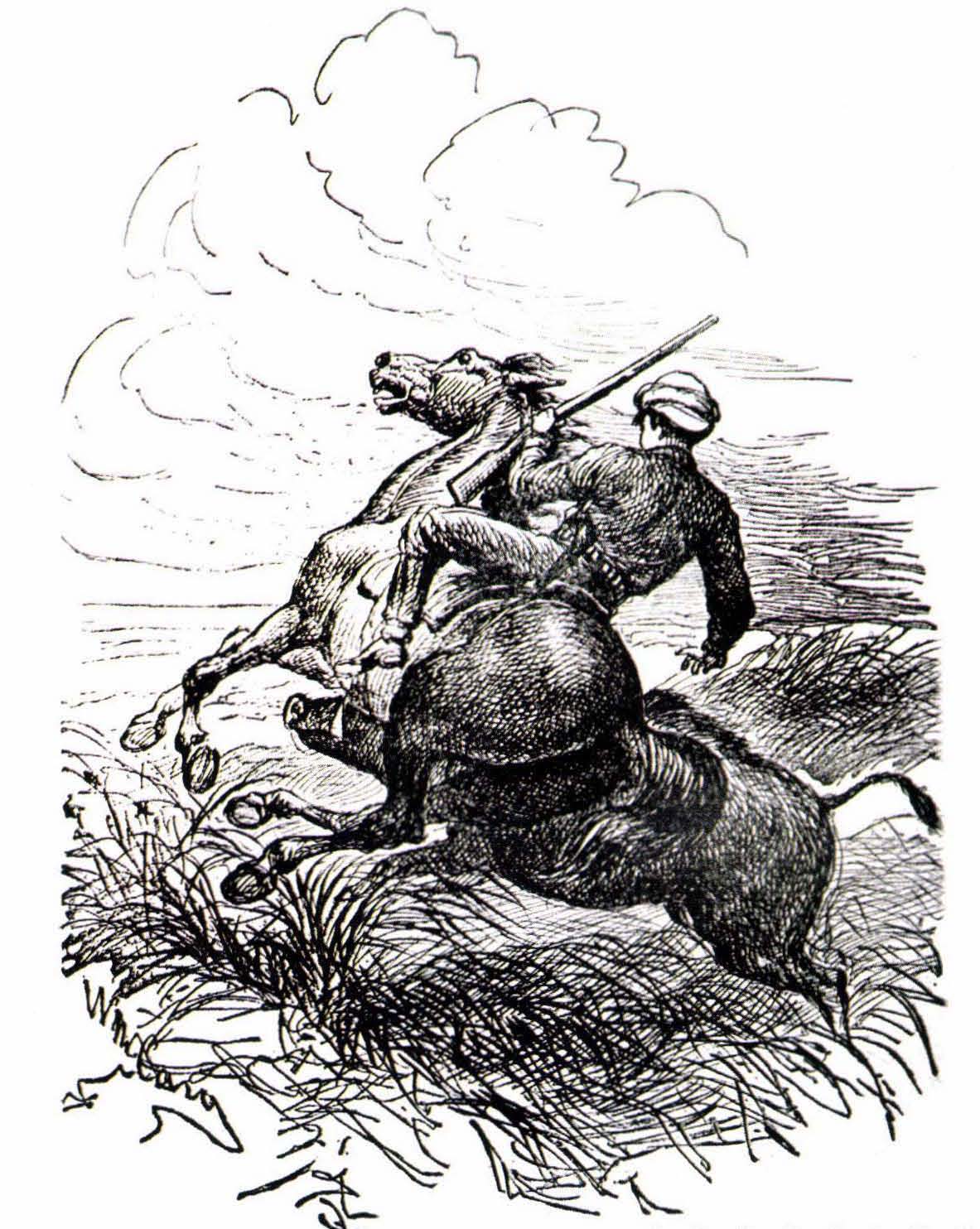
Mr. Godkin was terrified lest the youth should be killed. Springing from the back of his horse, he ran forward with the intention of planting a bullet back of the boar’s fore-leg, but the risk of hitting either the pony or his rider was so great that he dared not fire. To Mr. Godkin, it looked as if Dick’s chief danger was from the hooves of the pony, which were flying about in such a frantic way that they were likely to shatter his skull.
But at the edge of the plain the steed fought himself free and fell to the ground, Dick going with him. The boar paid no further attention to either, but simply ran into the jungle and vanished.
While the pony was clambering to his feet, Mr. Godkin hurried up and bent over his young friend, who was lying still.
“Are you hurt, Dick?” he asked, observing that his eyes were open.
“I’m bruised a little, but I don’t think any bones are broken,” he replied, rising slowly to his feet with the help of his companion.
The lad had dropped his gun and hat, and his clothes presented a sorry appearance; but it was just like the boy, after shaking himself together and finding that he was free from fractured bones, to ask in a quizzical voice: “How is the boar?”
Another Close Call
During his stay in India, Dick Brownell was involved in many perilous adventures, in most of which he was saved by his own intrepidity and coolness. But among all his thrilling experiences, I have no knowledge of any in which he displayed such marvelous presence of mind as in his encounter with a rogue elephant in the district of Oude.
When he was barely two rods from the furious brute that was charging down upon him, Dick brought his rifle to his shoulder, aimed quickly at the fatal spot in the front of the beast, and pulled the trigger, only to have his weapon misfire.
It was useless to turn and flee, for he could not go 20 steps before being seized by the trunk that was already extended to grasp him.
The lad proceeded to remove the defective cartridge and put another into its place. Then he hastily adjusted the breech and started to bring the gun to his shoulder.
But it was too late.
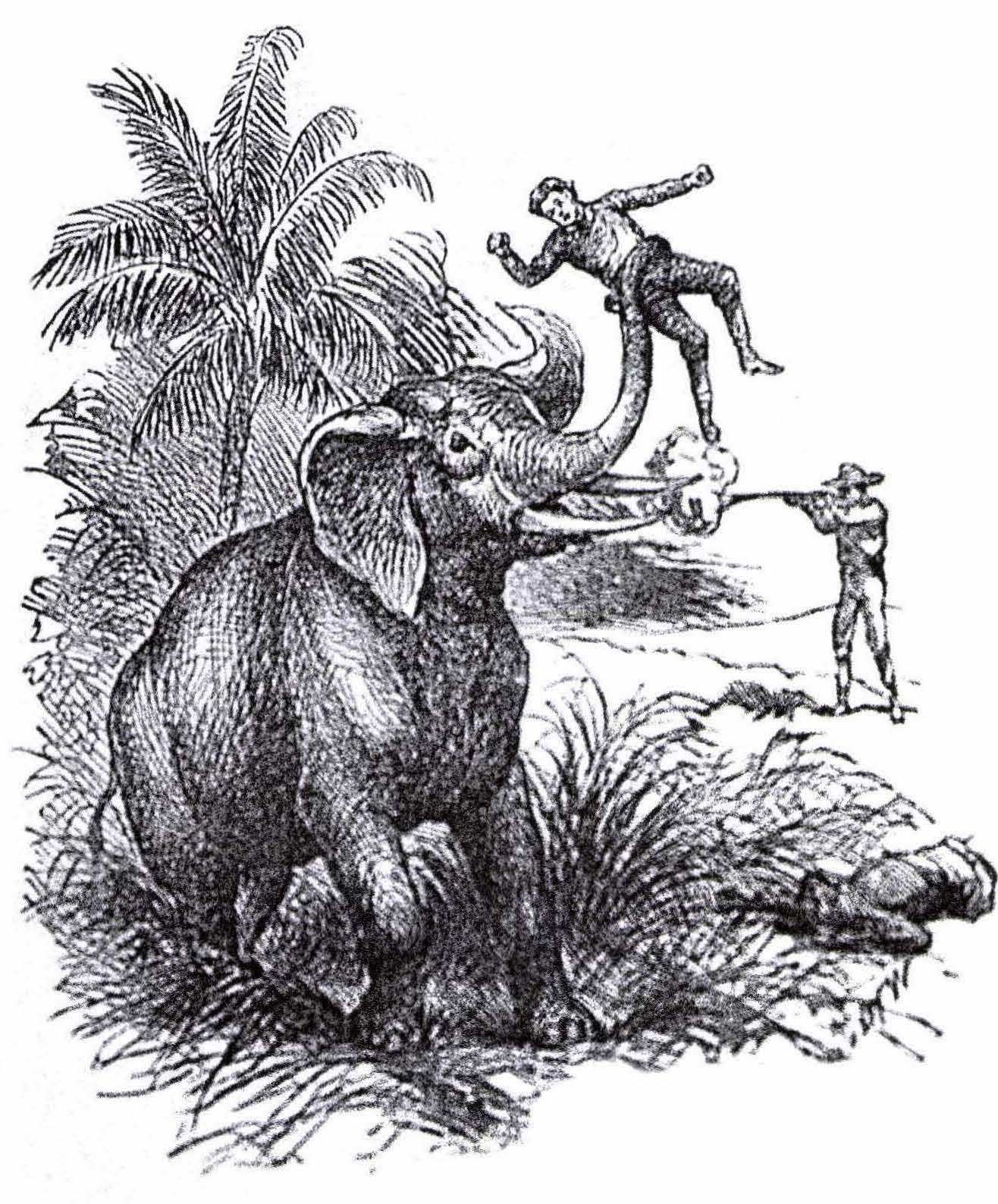
The outstretched trunk caught him about the waist just as he turned to dart aside, and he was held immovable.
Meanwhile, Mr. Godkin had not been idle. Catching up, he leveled his gun at the furious brute, but unfortunately his position was such that he could not select a fatal spot into which to drive the bullet.
With not a second to wait, the best and only thing he could do was to aim at the head and pull the trigger.
The ball crashed into the huge skull, inflicting a wound that perhaps was mortal, though not immediately so.
The smoke had not yet cleared from the muzzle, and the enormous beast gave no evidence of being hurt, except by an irritated flirt of the head. The horrified Mr. Godkin watched as the lad was lifted into the air, his arms and legs flying in a desperate effort to release himself from the terrible grip of the “goondah.”
At that instant, the monster laid the lad down, with the intention of kneeling upon him, that being one of the animal’s favorite methods of killing its victim.
You need not be told that no living creature can withstand the crush of so many tons. Many an elephant by such means has smashed a squirming tiger to pulp. Dick knew the purpose of the beast, and maintained his presence of mind. The moment the trunk relaxed its grip, and he found himself free, he rolled slightly to one side, so that the huge beam-like knee just missed him.
Dick quickly leaped to his feet and, as the disappointed elephant groped for him again with his trunk, half-turning his head to see what had become of him, the boy dashed between his hind legs.
As the beast inclined his head forward and downward to replace his victim in position for crushing, he exposed the most vulnerable joint in his armor. And when the brute was turning his head to see what had become of the boy, Mr. Godkin pulled the trigger. That did the business.
The ball tore its way through the thin sheathing of bone, which at that point covers the brain, and extinguished life as effectually as if the animal had been struck by a cannon ball.
The great beast stood motionless for a moment, with his head partly turned to one side, as though dumb. Then a shutter passed through the enormous mass, and down he went like a falling house, splintering one of his tusks at the base and emitting his death cry in one single whinnying snort, which was his last.
The well-mounted hunters had but a comparatively short distance to ride when they clashed into the tall grass, amid which grew a great deal of the native rice, of which the hippopotamus, as well as the rhinoceros, is so fond. The ponies, on necessity, slackened their pace, for knowing how quick the big game is to detect danger, the time had come for the exercise of extreme caution.
All at once Diedrick raised his hand as a signal for the others to halt. Although they saw nothing, there could be no doubt that he had detected something important.
Just in front, the grass that was five or six feet in height, became more dense and abundant. Several minutes passed, during which all were silent and listening. Diedrick then turned and explained that, while he saw nothing, he was of the belief that more than one animal was close to them. A gentle wind was blowing toward them, which was fortunate for the hunters, since the sagacious beasts would not be able to scent them.
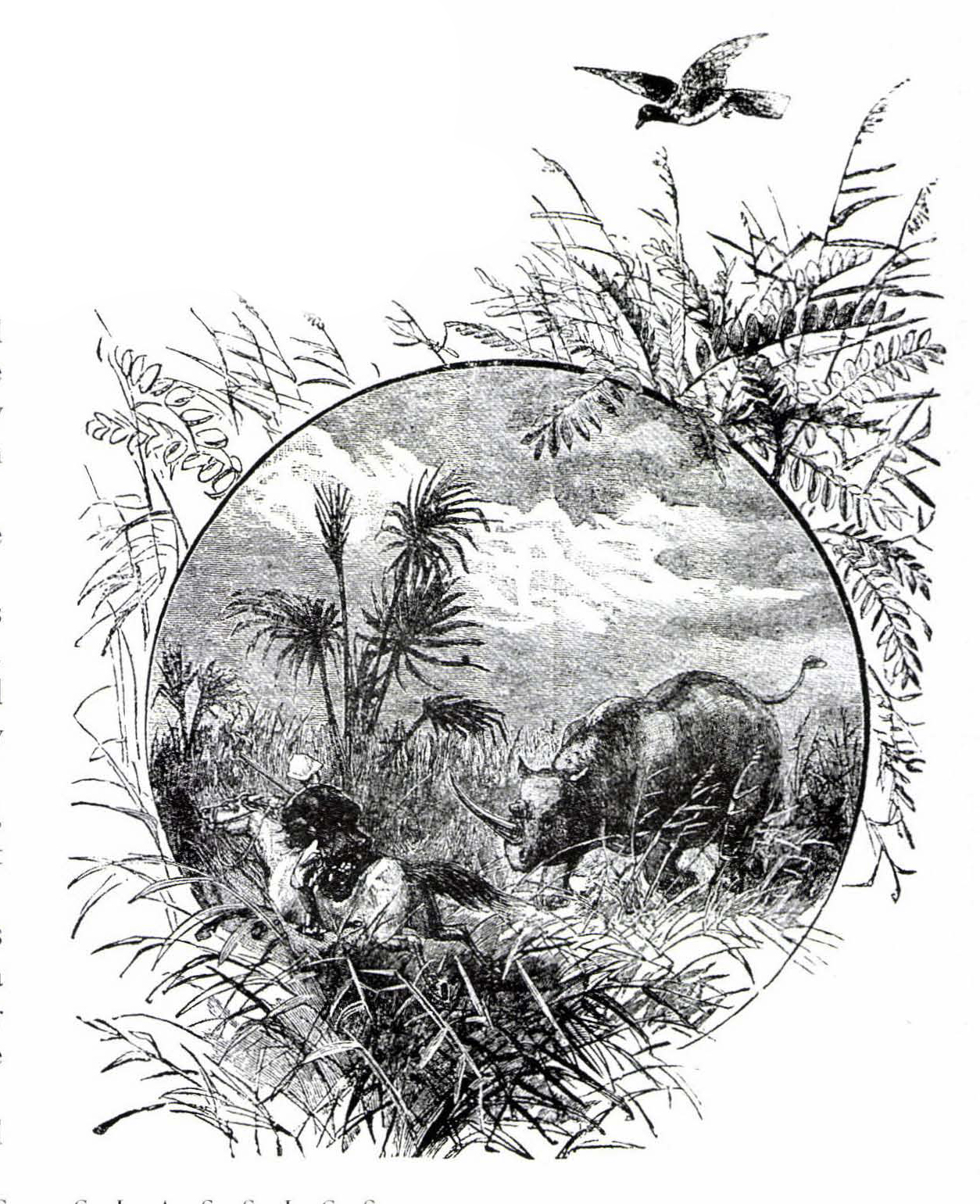
Diedlick proposed that he and one of the boys should make a circuit, which would take them around to the point a half-mile away. Then, if any rhinoceros was between the parties, he would discover his danger and make off toward those in waiting, who, if they used ordinary discretion, would gain a chance of bringing down some of the gigantic game.
This understanding was scarcely reached when a small bird suddenly rose from the grass at a distance of less than a hundred yards and, darting straight up in the air, gave utterance to a sharp peculiar note that could be heard a long way off.
The bird was the Buphaga africana, or rhinoceros bird, the most devoted and faithful friend of this giant animal. It constantly attends the beast, feeding on the insects that infest its muddy hide. While thus employed, it is on the lookout for enemies of the animal. The instant it detects the approach of the hunter, it flies above the beast, uttering sharp cries which he understands at once.
Many hunters claim that if the rhinoceros happens to be asleep when danger appears, the little friend will peck the inside of his ears until he awakens.
In the present instance, the party had come almost upon a rhinoceros without suspecting it. Indeed, the advance was so cautious that the vigilant bird did not immediately discover them. But it made up for its remissness by rising more than 50 feet from the ground, then descending and circling about in great excitement, all the time emitting its cries of warning.
The horseman could not see the rhinoceros, but he was plainly heard as he went crashing through the grass with a speed that the best steed would find hard to surpass when impeded by luxuriant vegetation.
The hunters decided that Diedrick and Bob Marshall should attempt the difficult task of reaching a point on the other side of the rhinoceros, while Jack and Dick should stay where they were in the hope that the game would be forced within reach of their guns.
Accordingly, the two friends turned their horses’ heads to the right and began the long circuit.
The tall grass continued abundant, and in some places it was no light work for the animals to force their way through. Diedrick rode a short distance in advance, leaning forward and peering right and left, like an Indian trying to steal his way through an enemy’s lines.
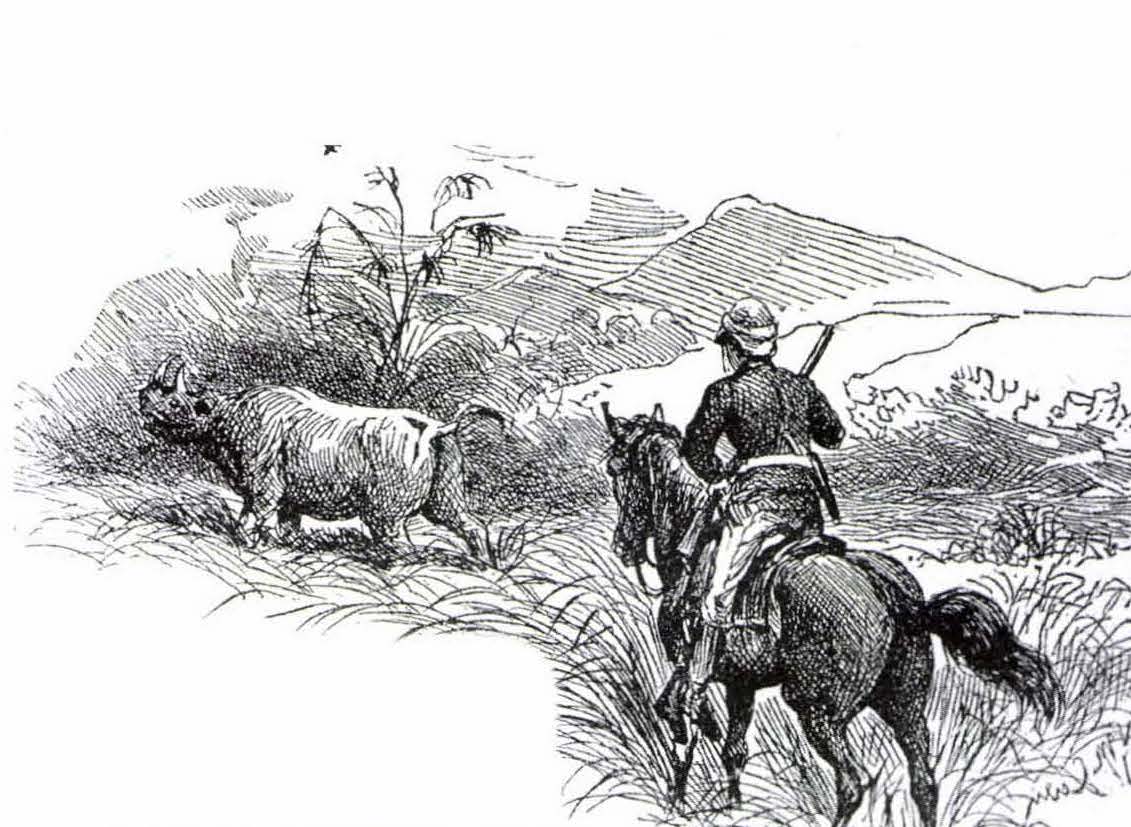
It was likely the rhinoceros, when he was warned by the bird, plunged through the grass to the right or left, so that he was not between the divisions of the party.
But Diedrick was hopeful that, if he was not there, others were, which would answer just as well. After penetrating a short distance, he suggested to the boy that they separate for a brief space, inasmuch as they would be more likely to drive out the game.
This was done, and the success was surprising and speedy. All at once the Buphaga africana uttered its piercing note, fluttered excitedly into view, gyrating about as though caught in a whirlwind and, proving beyond question, that enormous game was at hand.
As it was immediately in front of Bob that the bird rose, he spurred his horse forward and stood up in the stirrups so as to gain a view of the quadruped. He could see the swaying grass, and a second later he caught sight of the animal’s vast back, like a shoal of dried mud, as it swung ponderously through the vegetation. The legs of the rhinoceros are so short that a tall man can stand beside him and look over his back, and it is curious how such a bulky mass can obtain such great speed.
Nothing inspires a sportsman with courage so much as the sight of his fleeing game, and Bob urged his horse to do his best. The steed did not need spurring, but with a snort of excitement, galloped forward.
When the lad caught sight of the huge animal again, he could hardly contain his excitement.
“We’ve got him!” he called out.
Bob let the reins lie loose on his horse’s neck, while he held his rifle ready to fire whenever the proper moment should come.
The conduct of the little bird was not without interest. Having got its bulky friend on the run, it ascended still higher in the air, ceasing its cries as though content to view the chase from that elevation. When, however, the rhinoceros held up for a few moments, as if to take its bearings, the bird shot downward again, uttering such piercing warnings that the beast plunged forward with renewed speed.
About this time Bob became aware of the unpleasant fact that he was not gaining upon the game. The rhinoceros, perhaps on account of its vastly superior weight, crushed through the obstructions with greater speed than did the lighter and more graceful horse.
The sight of the laboring beast kept hope alive in the breast of Bob, who did not spare his animal, but strive as he might, he could not lessen the space between them.
“You shan’t get away without receiving something to remember me!” exclaimed the disappointed boy, bringing his rifle to his shoulder.
He had learned to fire from the back of a horse when on a gallop, and he was confident his aim was true at the moment he pulled trigger. Most probably he struck the rhinoceros, but the animal gave no evidence of it. Like a locomotive, he seemed to have gotten up steam, and he went crashing and plunging onward, as though he would bear down a tree or any obstruction in his path.
For a minute or two longer Bob could hear the animal tearing through the grass, though nothing could be seen of it. Even the alarm-bird was not visible.
“I wonder whether the old fellow won’t find out that a party is waiting in ambush for him, and turn about and come back for me: if he does, I’ll get a chance after all. But I suppose the bird will see the danger and will go to chattering and screaming again.”
There were few times in Bob’s life that he received such a shock as he did at that moment. Heming a movement in the grass behind him, he turned his head just as the horse began to show restlessness, and saw a second rhinoceros fully as large as the other, and not 20 yards distant.
It was truly extraordinary that he could have hidden so close to the game without it being detected, either by his steed or himself, but such was the fact, partly due, no doubt, to the concentration of the attention of boy and animal on the fleeing beast.
The rhinoceros that had just introduced himself was of prodigious size, and seemed of a milk-white color, though its hue was mainly due to the coating of dried clay that covered its entire body.
Though he saw the horse and rider, and in his dim, instinctive fashion must have comprehended that they meant business, the rhinoceros made no attempt to flee.
When Bob faced about, the beast was standing motionless, looking at him and his horse. The boy could not help wondering at the enormous bulk of the rhinoceros with the two curving horns over its nose. It was ugly beyond description, and its very repulsiveness was enough to make one run. But Bob felt the old thrill when he ran his eyes over the monster, and realized that the very chance he coveted was his. Here was the rhinoceros, and with no one in sight to rob him of the glory of bagging him.
Although the horse was naturally alarmed when confronted by such a frightful-Iooking enemy, he did not break away in a panic. He maintained his ground, though his rider felt him trembling like an aspen. So long as the rhinoceros approached no closer, he would not flee, but at the first advance of the terrible beast, the steed would have become ungovernable.
The two enemies stared at each other, probably for less than a single minute, when the young hunter felt it incumbent to do something. He could ask for no better opportunity and, raising his gun, sighted at the aggregation of ugliness in front of him and let fly.
His bullet struck the rhinoceros in the head. Just as Bob fired, a cold chill ran down his back. He recalled that Diedrick, in talking of these animals, had cautioned his friends against shooting at their heads, since it was almost impossible to inflict a fatal wound. The proper course was to fire into the side, say back of the foreleg, where the skin is thin and a vital portion can be reached.
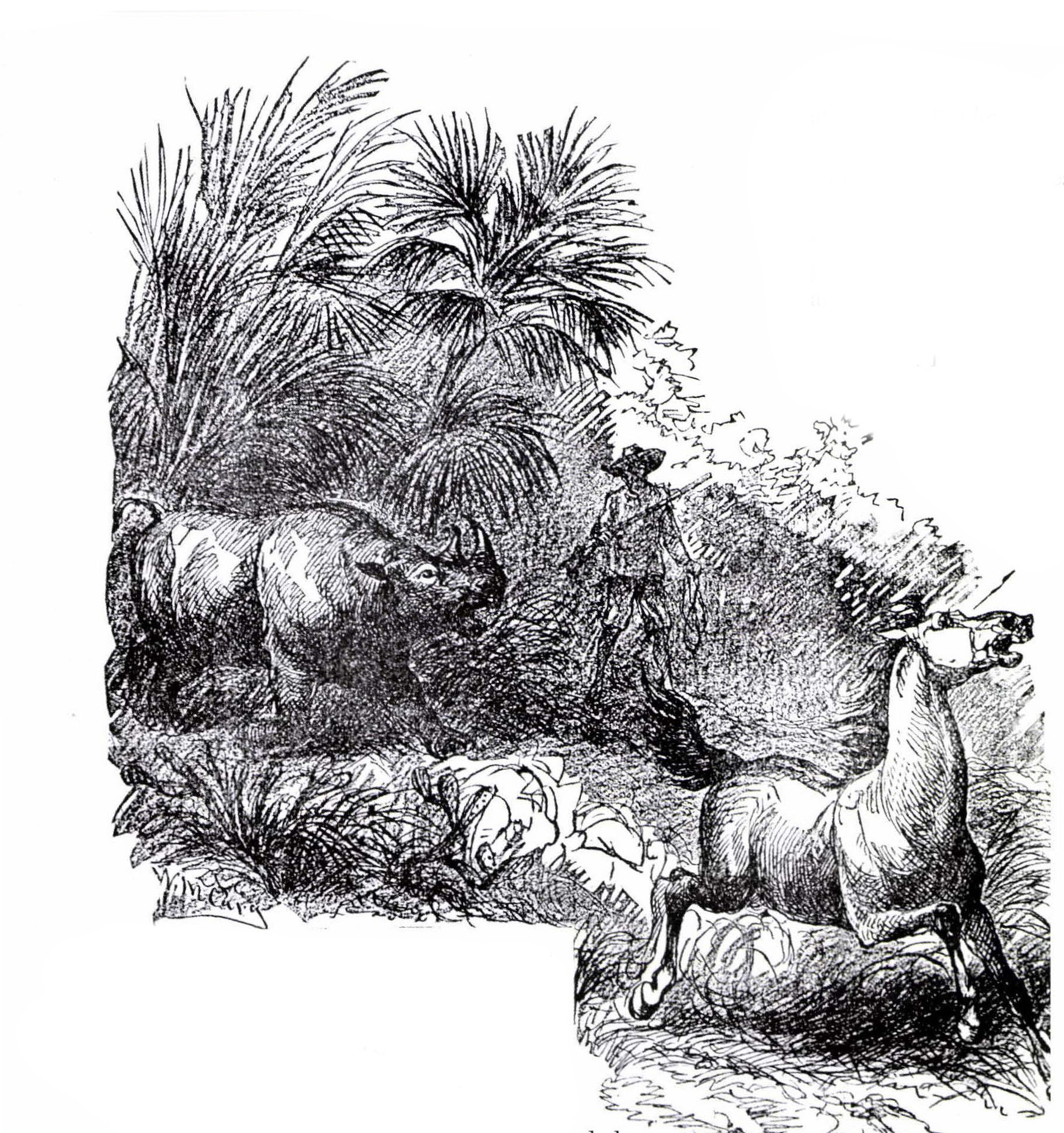
Almost at the same instant that the gun broke the stillness, the rhinoceros uttered a pig-like grunt and charged. It would have been beyond the power of the youth to restrain his horse had he wished to do so. He and his steed had become the hunted instead of the hunters.
The horse made a terrific leap and bounded off at the highest speed; it was by no means certain that even that would save them.
A colder shiver than before swwept over the youthful rider when he recalled the alarming fact that the first rhinoceros had made his way more swiftly through the tall grass than the horse was able to do so.
Bob continually glanced behind him and, with a fear that cannot be described, he saw the mountainous brute was steadily gaining ground.
It was useless to shout or to urge the horse: he was inspired by a mortal fear of the peril bearing down upon him.
Had Bob Marshall been on the open plain, he might have escaped, for there are few animals which in fleetness can equal a well-trained horse, but the pony was unaccustomed to the grass, which was scarcely any obstruction to the massive rhinoceros. It was hard, too, for the lad to know that, although he held a most excellent magazine rifle in his hands, it was practically useless. His pursuer presented no vulnerable point while charging upon him with such speed, unless it was his eye; and although, as I have said, the lad could fire quite well from the back of the steed, he was incapable of such marksmanship as was now required.
He made several flying shots, but it may be doubted whether he did more than graze the brute.
A short distance was ridden when Bob saw that his pony was doomed. The rhinoceros was not only gaining, but it was gaining rapidly and would quickly overtake the steed.
A few moments later the pursuer overhauled the fugitive.
The infuriated rhinoceros ran his snout under the belly of the horse, and Bob, feeling something strike his foot, glanced down. The point of the terrible horn had passed entirely through the body of his steed and touched his foot. Freeing his feet from the stirrups, the lad made a flying leap, landing in the grass.
During that time he heard the brief but furious struggle of his horse, which soon became still. He was quickly killed by his savage antagonist, which turned about to look for the missing rider.
The rhinoceros was much closer to the lad than was pleasant, but there was a chance that he would not be seen. He was lying in the grass, his gun a rod distant, and praying that he might escape discovery.
The beast, having finished his dreadful work, stood still, listening for some sound that would tell where the presumptuous youth was that had dared to assail him. Had Bob made the least noise the rhinoceros would have swept down upon him like an avalanche. From where he lay he could see the short, beam-like legs, but the massive head was uplifted so that it was on a line with the back.
Bob made no noise. He was lying on his face, with his hat on: his body flattened close to the earth. The rhinoceros stood in an attitude of intense attention for several seconds. Then the ponderous head slowly moved partway to the left, coming gradually back again, so as to make a semicircle. He was so close to Bob while making this movement that the youth saw distinctly the ugly-looking red lining of the upper lip, which overhung with a sharp point the lower jaw.
When the enormous bulk swung around so the two sword-like horns towered directly above the boy, the mass settled to rest as though the piggish eyes had detected something suspicious.
Finally, the hideous snout was lowered as though the owner believed his game had escaped. He made no further search, but with a grunting sniff, moved off through the grass and vanished in the vegetation, his crashing tread being audible for several minutes afterward.
Bob dared not stir until sure his enemy was gone. Then he rose to his feet, hurriedly recovered his rifle, and walked over to where his poor horse lay.
Tears came to his eyes as he gazed on the noble animal. Or rather, on what had been such a noble animal, for there was no breath left in his body.
“I would like to get another shot at that fellow,” he said, half tempted to turn about and hunt for him, “but there is not much use of pumping bullets into him unless you reach the right spot.”
 Sporting Classics has compiled this remarkable anthology showcasing the best African adventures published in our award-winning magazine.
Sporting Classics has compiled this remarkable anthology showcasing the best African adventures published in our award-winning magazine.
Ruark, Capstick, Roosevelt, Markham – the legends in outdoor literature are all here, sharing their stories of deadly encounters with dangerous game, of bizarre run-ins with witch doctors, gorillas and man-eaters, of safaris into the uncharted wilds of deepest Africa.
Illustrated by world-renowned artist Bob Kuhn, AFRICA features more than 400 pages of unforgettable stories by some of the finest professional hunters and writers of sporting adventure. Shop Now

